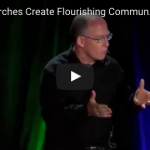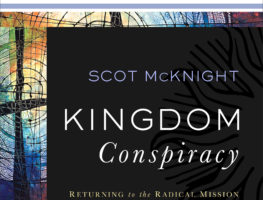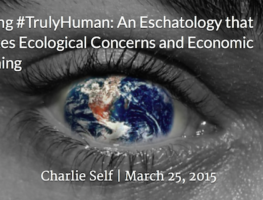Scotty is my mechanic. He operates an independent shop in Silicon Valley and is in his 40th year in business. He is cheerful, hard working and operates with great integrity and compassion. He repairs what’s needed, helps customers plan ahead and gets them on the road efficiently and safely. Very quietly, he helps those in need with free or reduced cost repair; especially single parents and those getting back on their feet. He does not do discounts, quick oil changes or other gimmicks. I will keep taking my cars to him until he decides to close.
Scotty is a faithful church member, volunteering often, giving generously and leading special fishing trips for men exploring the faith as they enjoy catch-and-release competition. One day he came to me and exclaimed, “Pastor Charlie, I just realized I am as much a minister as you are!” I laughed and said, “That’s right brother!” Scotty continued: “I meet people in crisis, have as much knowledge as some doctors, solve problems quickly and continually update my information and technology…not to mention keep up with all the regulations and taxes. People share their lives with me. What an awesome responsibility.”
But wait…there is more! Scotty has led many to Christ and helped others find their way back to fellowship. His giving and volunteer efforts are exemplary. In addition to all the helpfulness, Scotty is helping an entire community flourish and he is part of God’s reign, bringing hope and justice for many. He employs six others and his business feeds over thirty people. Hundreds of cars repaired each month mean thousands of productive hours gained and millions of dollars toward the local economy. His rent, taxes and workers’ compensation payments (he wishes all of these were a bit lower and more efficient) are funding others. Scores of folks can get to work and church, go on vacation and otherwise be about busy and productive lives because of his work.
Scotty is an exemplar of one of the most important mission trends in five centuries. Since Luther and the Reformers proclaimed the priesthood of all believers and Vatican II declared the “apostolate of the laity,” much has been spoken and written about “lay mission” “marketplace ministry” “tent making missions” and “bivocational ministry.” Many thinkers have worked hard to bridge the sacred-secular divide (SSD) and several business-as-mission think tanks and agencies are operating fruitfully. All these trends are commendable and need even more encouragement from spiritual leaders.
The new trend exemplified by Scotty incorporates all the aforementioned ideas: integrating faith and work, seeing our labor as a calling, working for justice in fields and factories. The new trend is the full integration of the Mission of God with economic flourishing. Believers are commissioned by Christ and empowered by the Spirit to “make disciples” that can lead others to faith and create wealth as they fulfill the Great Commission (Mt. 28:18-20; Acts 1:8) through lives shaped by the Great Commandment (Mt. 22:37-40). Economics is a moral art and science, activity that is at the heart of Creation as God called humankind to co-create and care for his world.
A vibrant eschatology propels followers of Jesus to live the future now in the power of the Spirit because of the resurrection of Jesus Christ. All our activity is now infused with faith, hope and love (I Thess. 1:1-5) and there is no longer any sacred-secular separation as all is done for the glory of God and the good of others (Rom. 12:1-8; Col. 3:16-24). Every act of peacemaking, ethical enterprise, compassionate gift and wise management is a signpost of the coming kingdom.
There are many hopeful signs of the Spirit working in churches and seminaries, businesses and non-profits, education and mission agencies. The Acton Institute for Religion and Liberty (www.acton.org) is a leading ecumenical think tank integrating good intentions and sound economics, economic flourishing and true social justice. Their two latest video series, Poverty Cure and For the Life of the World: Letters to Exiles get beyond of paralyzing libertarian and progressive categories and offer insightful, nuanced and practical insights for transforming communities. The Oikonomia Network (www.oikonomianetwork.org) with generous help from the Kern Family Foundation is helping transform seminary curricular and co-curricular equipping of present and future church leaders. 19 seminaries are committed to faith, work and economics integration that connects Sunday and Monday, ministry and work, economic flourishing with missional progress. A brand new whole life discipleship assessment resource from Discipleship Dynamics (www.discipleshipdynamics.com) integrates spiritual, personal, relational, and vocational and economic/work outcomes as believers and communities objectively evaluate their integration and maturity in Christ. Brett and Lyn Johnson have transformed businesses and equipped hundreds of business missionaries over the past two decades (see www.inst.net and www.repurposing.biz).
What dos all this mean on a practical level? Spiritual leaders can no longer hide behind false dichotomies of clergy/laity, sacred/secular, profit/non-profit, success/significance or any other unbiblical combinations that disempower the vast majority of Christians. Ideological strongholds of Left and Right, Conservative and Liberal, Communitarian and Individualist must yield to biblical integration as God’s people realize that Jesus is “not a tame lion” (C.S. Lewis) and there are no human boxes that can contain our Lord (Peter Kreeft). For daily and weekly praxis, this vision of integration completely transforms the gathered and scattered church:
- Worship services are convened by the Triune God for his glory and the edification of Spirit-transformed ministers of a new covenant who are the fragrance of Christ and competent servants in their vocations (2 Co. 2-4).
- Commissioning now includes all occupations and callings, not just paid ministry positions.
- Church health is measured by kingdom metrics that include compassion work in the community, starting new businesses, engaging in political service and all manner of initiatives “outside the walls” of our cells and celebrations.
- Believers can work locally (and beyond) with all people of goodwill for the health of their communities.
- Church planters/revitalizers ask new questions about their mission, such as, “How will our community thrive 10, 20 and 40 years from now?”
- The Church once again leads the intellectual, social and even political discourse as people of diverse parties learn new synergies and discover that the cruciform life and resurrection power of the Spirit reshape all facets of being human.
- And in our discipleship, we need to stop nurturing missional narcissism and help young and old get working while they aim toward their highest aspirations.
Economic flourishing is more than a mission trend or the human need to eat. It is part of the Creator’s design before the fall and after the Parousia. From Genesis 1-2 and Revelation 19-22 we see humankind worshiping and working, reveling is glory and resting in grace. Those who were faithful in little in this age discover much to steward in the Age to Come. The future Shalom begins today as each disciple discovers the good works designed for them (Eph. 2:8-10). It is time to flourish – regardless of which parties are in power or which subcultural conflicts the church endures.
Our created purpose and redeemed destiny intersect in our daily work, whether paid or unpaid, private or public, labor or leadership.










Missio Alliance Comment Policy
The Missio Alliance Writing Collectives exist as a ministry of writing to resource theological practitioners for mission. From our Leading Voices to our regular Writing Team and those invited to publish with us as Community Voices, we are creating a space for thoughtful engagement of critical issues and questions facing the North American Church in God’s mission. This sort of thoughtful engagement is something that we seek to engender not only in our publishing, but in conversations that unfold as a result in the comment section of our articles.
Unfortunately, because of the relational distance introduced by online communication, “thoughtful engagement” and “comment sections” seldom go hand in hand. At the same time, censorship of comments by those who disagree with points made by authors, whose anger or limited perspective taints their words, or who simply feel the need to express their own opinion on a topic without any meaningful engagement with the article or comment in question can mask an important window into the true state of Christian discourse. As such, Missio Alliance sets forth the following suggestions for those who wish to engage in conversation around our writing:
1. Seek to understand the author’s intent.
If you disagree with something the an author said, consider framing your response as, “I hear you as saying _________. Am I understanding you correctly? If so, here’s why I disagree. _____________.
2. Seek to make your own voice heard.
We deeply desire and value the voice and perspective of our readers. However you may react to an article we publish or a fellow commenter, we encourage you to set forth that reaction is the most constructive way possible. Use your voice and perspective to move conversation forward rather than shut it down.
3. Share your story.
One of our favorite tenants is that “an enemy is someone whose story we haven’t heard.” Very often disagreements and rants are the result of people talking past rather than to one another. Everyone’s perspective is intimately bound up with their own stories – their contexts and experiences. We encourage you to couch your comments in whatever aspect of your own story might help others understand where you are coming from.
In view of those suggestions for shaping conversation on our site and in an effort to curate a hospitable space of open conversation, Missio Alliance may delete comments and/or ban users who show no regard for constructive engagement, especially those whose comments are easily construed as trolling, threatening, or abusive.